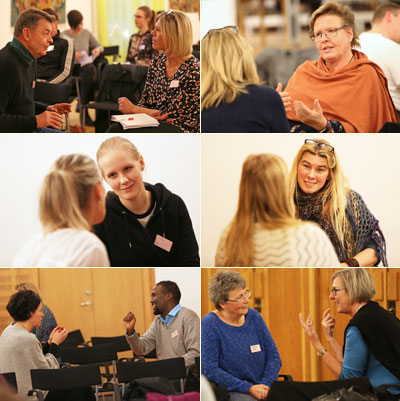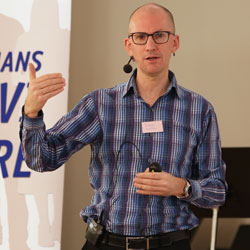
About Shakya Kumara
Shakya Kumara is an Executive Coach, Solutions Focused Trainer, and the founder of Brief Mindfulness. He has 25 years experience with mindfulness, and over 20 years experience with Solution Focus.
Shakya is the creator of various Solution Focus training models, including "iFLOW" Personal Organisation and the "MAGIC" model of Negotiation, both of which are in use around the world. He trains managers in Solutions Focused Coaching Culture, as part of Mark McKergow's SF Work team.
Mindfulness and Solution Focus for Coaches - December 6, 2017
This is a one day workshop for professionals, coaches, managers and team leaders – anyone who experiences stress or has conversations with others who experience stress!
You will learn a number of tools, drawn from Brief Mindfulness and Solutions Focus, which will help you to manage your own stress levels and help other people to manage theirs.
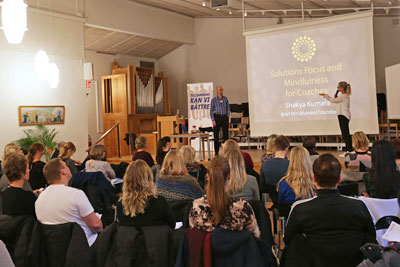
Sussan Öster introduces Shakya Kumara.
Shakya Kumara - Presentation
Shakya Kumara started this session by giving a brief description of his own background and experience of mindfulness and the great impact you can gain from applying mindfulness -
Better results, more quickly, with less stress.
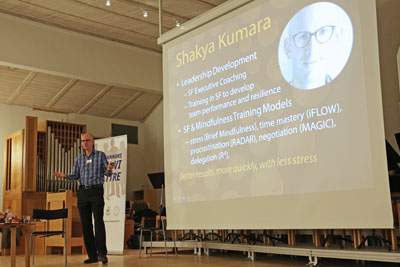
Shakya Kumara - Leadership Development, Solution Focus and Mindfulness Training Models.
Today´s Overview
- When were you most engaged and alive?
- Mindfulness "QuickStart"
- Reducing stress and boosting focus in two minutes/day
- Defusing a specific stressor in four minutes - Mindfulness Meditation
- Developing calm and natural focus - Coaching people suffering from stress
- How Solution Focus and mindfulness help
- Solution Focus and Mindfulness toolkit
1. First Exercise - Introduction

In pairs, ask your partner: "In the last six months, when were you most engaged and alive?"
- From that experience, pick a particular moment.
- Listen out for details - what did they see, hear, feel?
- Summarise that in a single sentence.
Examples:
"- Spent time with my grandson who did something totally unexpected and I went completely with it. "
"- Walked around the lake in Lindesberg and enjoyed nature."
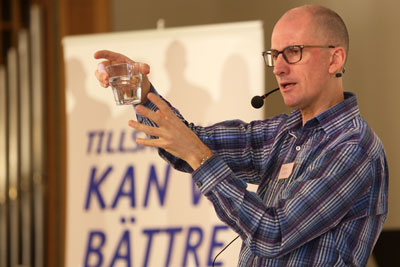
Shakya described how we can make our everyday experience (even just a glass of water!) more like these wonderful moments, just by practising mindfulness.
2. Mindfulness "QuickStart"
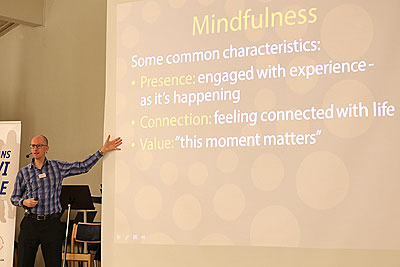
Some common characteristics:
- Presence: engaged with experience - as it´s happening
- Connection: feeling connected with life
- Value: "this moment matters"
Benefits of Mindfulness
Effectiveness
- Focus - Less distraction/interference, Sustained for longer - More connected with purpose
- Meaning and Motivation - Purpose - Perspective - Engagement
- Memory - Recall (particularly under pressure)
- Creativity - Problem solving
- Decision-making - Avoid sunk-cost and emotional bias - Improved CSR
- Leadership - effects on employees -
Job and Psychological need satisfaction, Performance - Organisational citizenship
Well-Being
- Physiological - Immune function - Blood pressure - Sleep
- Negative Emotion - Stress - Anxiety - Depression
- Positive Emotion - Resilience - Openness, curiosity, flexibility - Enjoyment of what already is - Kindness and compassion
- Social - Emotional Intelligence (Regulation), Relationships
- Employer Perspective - Reduced Absence - Reduced Turnover (intention) - Increased Engagement
Why Brief Mindfulness?
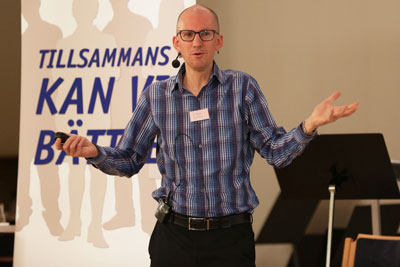
With all these benefits, why wouldn't everyone practice mindfulness?
With all these benefits, why doesn't everyone practice mindfulness? What's the catch? Shakya told us that it's often about time - with a conventional MBSR programme, you need to spend an hour a day for 8 weeks. It's great if you can spare the time, but many people can't. That's why Shakya created Brief Mindfulness. He explained the rationale and benefits:
- Brief Mindfulness is designed for the workplace, not clinic or temple!
- Because we lead busy lives, it includes a way to practice in 30 seconds, without closing your eyes or changing your posture.
- Because challenges can "get to us", it includes a 4 minute technique to address a specific stressor.
- Because we've got lots of things to do, it integrates mindfulness into purposeful activity.
More about Mindfulness and benefits from it at Shakya´s website:
What is Mindfulness? - briefmindfulness.com
Exercise - Targeted Mindfulness
When you want to bring Mindfulness to a particular issue, you can use the "Targeted Mindfulness" exercise. This is particularly useful when you have something that´s creating stress and interfering with your effectiveness and enjoyment.
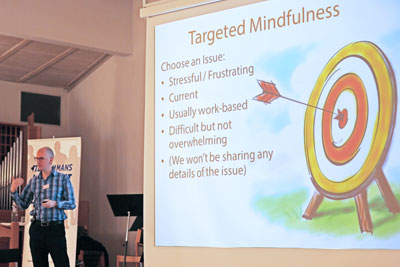
Some reflections from doing the exercise Targeted mindfulness:
- "I started to think about the frustration of always having a full inbox of mail- after the exercise I changed from being stressed to feeling needed and important."
- "By doing the exercise I started to think in a solution focused way."
According to Shakya Targeted Mindfulness is also a great thing to do regularly. After a week or two of daily Targeted Mindfulness, people often find their response to stress has changed – difficulties simply don´t get to them in the same way they used to.
Exercise - Reconnect in pairs
Reconnect is a short mindfulness exercise which people can do in 30 seconds, without closing their eyes or changing their posture. It's a way of Reconnecting with experience and purpose, in the midst of even the busiest day.
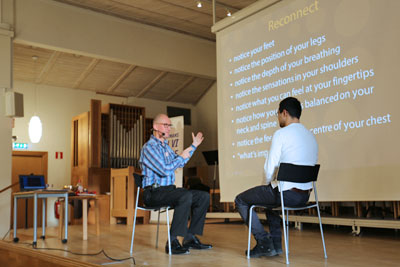
 The participants were given time to guide each other through the exercise "Reconnect".
The participants were given time to guide each other through the exercise "Reconnect".
Reconnecting in Your Daily Life
Shakya inspired us to:
"Challenge yourself for the next three weeks to "Reconnect" four times a day for 30 seconds."
But in order to do so you need to find out when you need to reconnect.
Exercise - Find out When to reconnect?
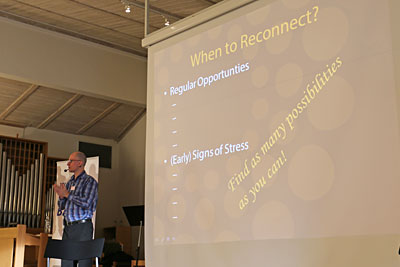
When to Reconnect? Regular opportunities and (Early) signs of stress. Find as many possibilities as you can!
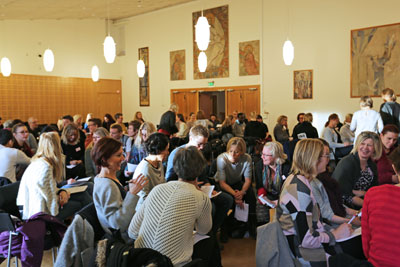
Discussions in groups about When to reconnect?
This is what the groups came up with:
Regular opportunities:
About to eat - In the shower - Breakfast meeting - At lunch, before or after - Watching TV - Waiting for the computer - Going to the toilet - Before "fika" - In the parking lot - On the bus/train - Standing in queue - Waiting for the microwave to heat food - During TV commercials - After the kids have fallen asleep - Before, after and in between meetings...
Early signs of stress:
When you cannot find your mobile phone - Trying to do stuff and not get anything done - Forget your aim - When you think your computer is too slow - Feeling stress in your stomach - Tense in your shoulders - Feeling everyone else is moving to slowly...
After the discussions everyone got the opportunity to guide themselves through "Reconnect". Some reflections after the exercise were as follows:
- "I feel very relaxed and focused."
- "I have really connected with my body and mind for a short time."
- "I am very much here and now."
3. Resilient Mindfulness
In this course we have covered the first two levels of mindfulness.
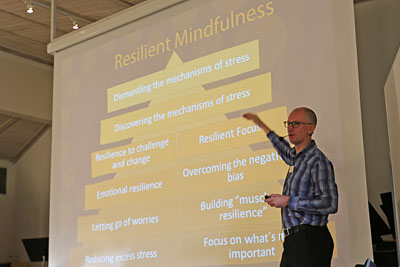
First two levels: 1. Reducing excess stress/focusing on what´s most important 2. Letting go of worries/building "muscles" of resilience"
As this diagramme, above, illustrates, there are another four levels which build upon the foundations we can lay through these practices. The higher levels of practice lead towards a profoundly peaceful state of mind, in which you can spontaneously respond at your best, even under the most challenging circumstances.
Exercise - Mindfulness for Coaches
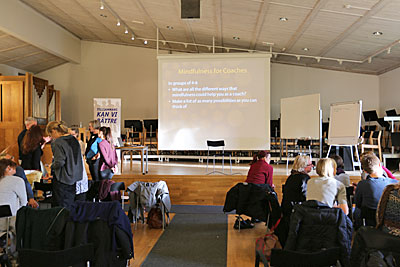 In groups of 4-6:
In groups of 4-6:
- What are all the different ways that mindfulness could help you as a coach?
- Make a list of as many possibilities as you can think of.
Some reflections from the groups about how mindfulness could help you as a coach:
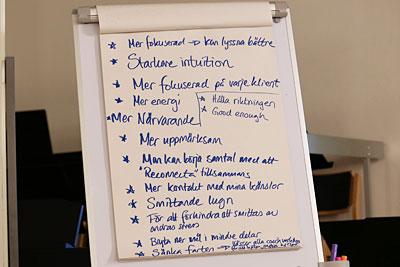
- Stronger intuition
- More focus on each client
- More energy
- More present
- More attentive
- More focus and listen better
- More connected with my feelings
- Calming effect on others
- Helping clients reach the goals by breaking down golas into smaller pieces
- Slow down
- To hold the direction and not miss the direction
- Lower stress levels: Allow people to be good enough and not being stressed by being perfect.
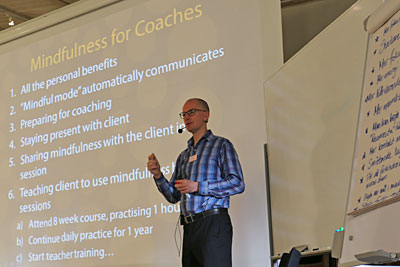
Shakya summarized and inspired the group to learn more - there is an eight-week course available including practising one hour a day.
Examine a Raisin with all Your Senses

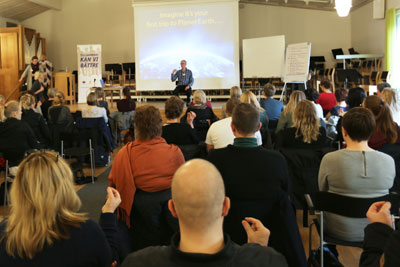
Shakya opened our eyes to how much there is to receive from a raisin - regarding look, feel, smell and taste. Through the slow process, we experienced the raisin in a whole new way.
And then we got to think about -
What difference would it take to do this in your daily eating?
- Smaller portions, better digestion, more enjoyment...
If you would like to see more examples of this exercise - search for Raisin Meditation/Raisin Mindfulness at YouTube and you will find many examples.
Defining and Practising Mindfulness
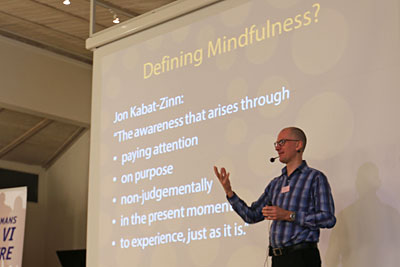
Defining Mindfulness? Jon Kabat-Zinn: "The awareness that arises through - paying attention - on purpose - non-judgmentally - in the present moment - to experience, just as it is"
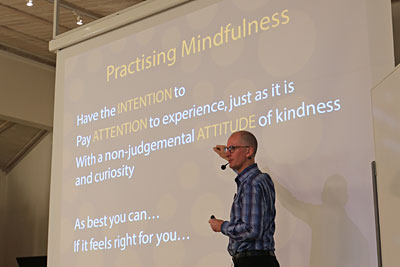
Practising Mindfulness Have the INTENTION to: Pay ATTENTION to experience, just as it is - With a non-judgemental ATTITUDE of kindness and curiosity. As best you can... If it feels right for you...
Cycle of Meditation
Shakya introduced us to the Cycle of Meditation.
Choose focus -
Engage - Wander - Realise - Return...
Engage - Wander - Realise - Return...
see picture below.
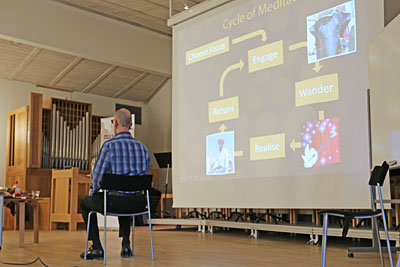
Shakya showed us how to sit when meditating.
At some point, the mind will naturally Wander from the chosen focus. That´s fine – that´s just what minds do! We´re proceeding around the Cycle of Meditation (se picture above). At some point we will Realise that the mind has wondered – that´s the next step around the Cycle. This is sometimes called the "Magic Moment" – we´ve "woken up" to our experience and remembered our intention. How does that happen? Can you observe the process in your mind as it occurs? Having realised that the mind has wandered, it´s time to gently and kindly bring the attention back to the chosen focus. Returning in this way completes the cycle, and we´re ready to Engage again.
Exercise - Ten Minutes of Meditation
Shakya guided us through a ten minutes meditation.
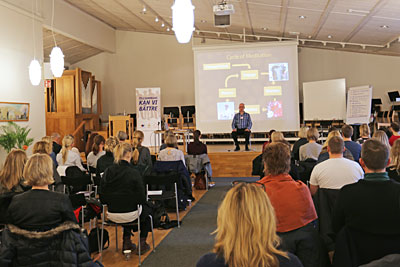
Shared experiences after the meditation session:
- "You can really feel your blood pulsing in your body."
- "I closed off and didn´t hear you until I almost fell off the chair."
- "My mind was wandering and I didn´t judge myself."
- "I felt like forever... in a good way - much longer than ten minutes."
4. Coaching People Suffering from Stress
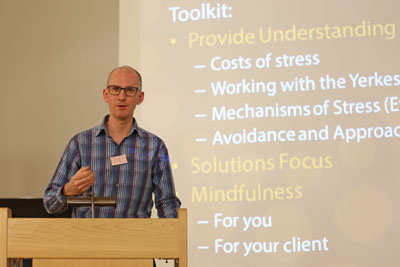
Stress costs society enormously because of absence from work. Stress also causes everyday issues like loss of sleep and increased irritability, which affects quality of life and stability of relationships. At work it impacts performance, customer experience and teamwork.
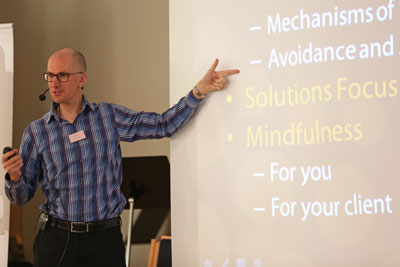
By using Solution Focus and Mindfulness you can help your clients and yourself handling stress.
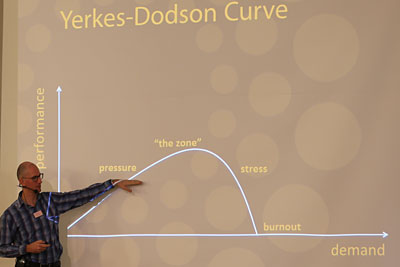
Yerkes-Dodson Curve shows how individuals respond to increased demands and pressures, initially, increased demand results in increased performance. With higher levels of demand, though, performance levels out, and then tails off sharply – stress is having an adverse effect.
What Can We Do?
The picture below shows three types of intervention: Relaxation - Stress Management and Mental Fitness Training.
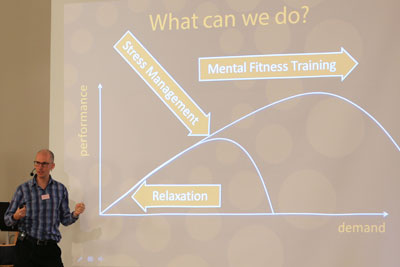
Mental Fitness Training develops the capacity of the individual. Instead of tailing off, their performance continues to increase with higher levels of demand. That means they can handle more responsibility and pressure, in a more sustainable way.
Avoidance and Approach Mode
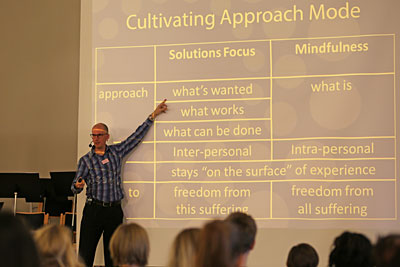 Shakya gave us a lesson in how the brain works and introduced the two concepts "Approach mode" and Avoidance mode.
Shakya gave us a lesson in how the brain works and introduced the two concepts "Approach mode" and Avoidance mode.
Avoidance mode is all about getting away from what´s not wanted. It´s all about what´s wrong – living in the avoidance mode means living in a world of problems and stress.
Approach mode, on the other hand, is oriented towards what is wanted. It takes a balanced view – yes there are difficulties, but there are also things that are already going well, and opportunities to make them even better. This perspective makes it easier to enter "rest and digest" mode when appropriate – so recreational time is more refreshing, and people can be more resourceful at work. They can adapt to change more easily – appreciating benefits and opportunities of change more naturally, and enjoying the process of finding creative solutions for the genuine problems that inevitably arise.
Shifting from Avoidance Mode to Approach Mode
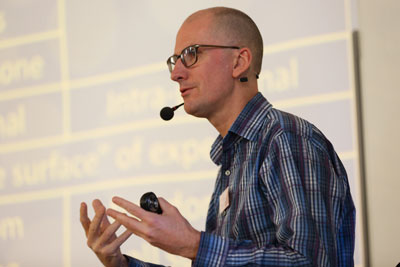
People can enter approach mode in two ways – through working with their own mind or in communication with others.
Solution Focused coaching is an excellent way to help people into the approach mode, for example:
- Asking "what do you want instead?" (of a difficulty).
- Asking a miracle question.
- When using a scale, asking "what makes it that and not less?" "what´s the highest you´ve ever been?" etc.
- Affirming their positive qualities.
- Inviting them to consider small steps (which they can easily imagine accomplishing, rather than grand plans which might trigger avoidance).
- Reviewing by asking "what´s better?" rather than "did you do what you said you would?"
Live Coaching Demo
Brave Pauline took place on stage for a 20-minute coaching session by Shakya.
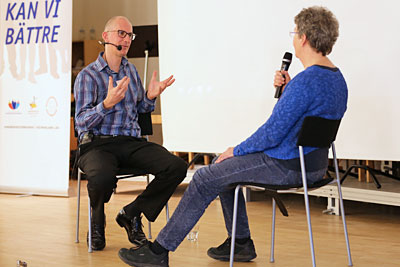
During the coaching session, Shakya wanted the audience to notice:
- What went well?
- All the skills/qualities about Pauline.
- What else did you notice about the coaching session?
After the coaching, a good dialogue with the audience followed, and Pauline also told us about her reflections:
- "Shakya helped me to see another part of myself through his questions."
- "I realised that I have everything in me - I have the answers."
- "I felt that you fully trusted in me."
Exercise - Practising Live Coaching
16 minutes of coaching - spend 4 minutes talking about "What helped" and then switch roles.
What helped being coached?
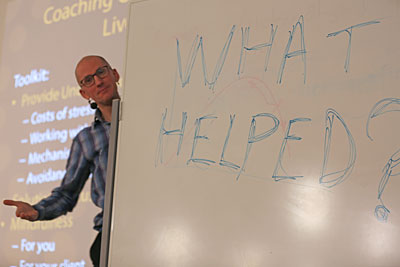
Some reflections:
- "She helped me see things from different perspectives/angels."
- "She gave me plenty of time to think."
- "I felt my idea was a good idea - she helped me to develop my idea. She smiled, nodded and asked "What more?" and "What would it be like?".
- "My coach was very present. Nodding, leaning forward, asking questions - Did I understand you right? etc."
Today´s Summary
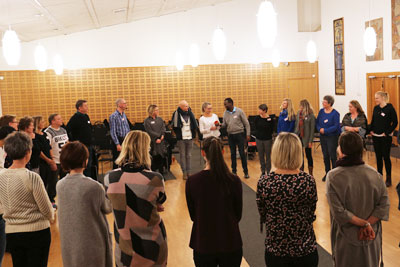
What do you take away from today?
- Questions
- Picture of the brain
- The elephant and the rider
- Mindfulness
- Breath
- Courage and peoples´ stories
- Presence
- 30 seconds, four times a day
- Energy
- Targeting mindfulness
- Trust the process
- Effects of the reconnect
- More mindfulness for myself
- Reconnect before coaching session
- Stay focus
- Creativity
- Ideas about handling relatives at Christmas.
Finishing
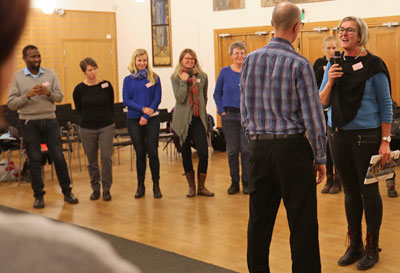
Ann Åkerlund-Rilegård thanks Shakya Kumara for this fantastic day.
Find Out More
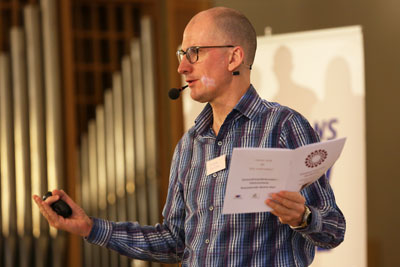 Some of the text above is taken from the folder Solution Focus and Mindfulness - training programme with Shakya Kumara. Everyone who participated today received the folder and was invited to the three-week e-mail course.
Some of the text above is taken from the folder Solution Focus and Mindfulness - training programme with Shakya Kumara. Everyone who participated today received the folder and was invited to the three-week e-mail course.
To find out more about Shakya, and access his free Brief Mindfulness resources, go to http://www.briefmindfulness.com/l/free-resources/
Today's Organizers
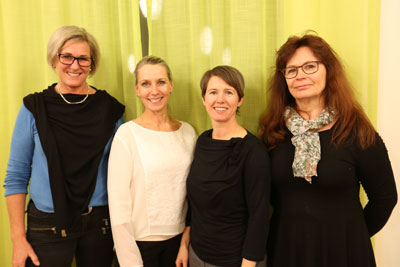
Ann Åkerlund-Rilegård, Sussan Öster, Linda Anderfjäll, Ann-Kristin Ekman.
- Ann Åkerlund-Rilegård, Norra Västmanlands Samordningsförbund
- Ann-Kristin Ekman, Samordningsförbundet Västerås
- Linda Anderfjäll, Samordningsförbundet Västra Mälardalen
- Sussan Öster, VITAL goodsolution
Summary and photo: Christina Wallnér, No WaIT AB

